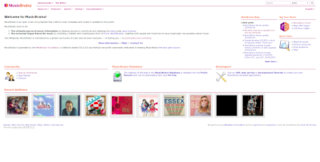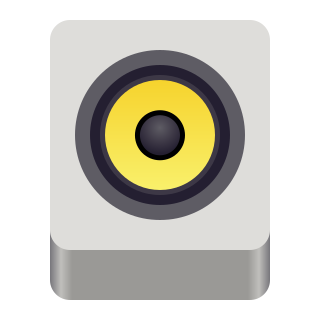Related Research Articles

TiVo Corporation, formerly known as the Rovi Corporation and Macrovision Solutions Corporation, was an American technology company. Headquartered in San Jose, California, the company is primarily involved in licensing its intellectual property within the consumer electronics industry, including digital rights management, electronic program guide software, and metadata. The company holds over 6,000 pending and registered patents. The company also provides analytics and recommendation platforms for the video industry.

MusicBrainz is a MetaBrainz project that aims to create a collaborative music database that is similar to the freedb project. MusicBrainz was founded in response to the restrictions placed on the Compact Disc Database (CDDB), a database for software applications to look up audio CD information on the Internet. MusicBrainz has expanded its goals to reach beyond a CD metadata storehouse to become a structured online database for music.
Music information retrieval (MIR) is the interdisciplinary science of retrieving information from music. Those involved in MIR may have a background in academic musicology, psychoacoustics, psychology, signal processing, informatics, machine learning, optical music recognition, computational intelligence or some combination of these.

Rhythmbox is a free and open-source audio player software, tag editor and music organizer for digital audio files on Linux and Unix-like systems.
Desktop organizer software applications are applications that automatically create useful organizational structures from desktop content from heterogeneous types of content including email, files, contacts, companies, RSS news feeds, photos, music and chat sessions. The organization is based on a combination of automated scanning of metadata similar to data mining and manual tagging of content. The metadata stored in applications is correlated based on a structure for the data type handled by the organizer tool. For example, the email address of a sender of an email allows the email to be filed in a virtual folder for the author and company the author works for or a music file is filed by the musician and album label. The resulting visualization simplifies use of desktop content to navigate, search, and use related information stored on the desktop computer. The data in desktop organizer tools is normally stored in a database rather than the computer's file system in order to produce virtual folders where the same item can appear in multiple folders to the user based on its relationship to the folder.
XML Shareable Playlist Format (XSPF), pronounced spiff, is an XML-based playlist format for digital media, sponsored by the Xiph.Org Foundation.
RhythmOne plc, previously known as Blinkx, and also known as RhythmOne Group, is an American digital advertising technology company that owns and operates the web properties AllMusic, AllMovie, and SideReel.
Cactus Data Shield (CDS) is a form of CD/DVD copy protection for audio compact discs developed by Israeli company Midbar Technologies. It has been used extensively by EMI, BMG and their subsidiaries. CDS relies on two components: Erroneous Disc Navigation and Data Corruption.

Gracenote, Inc. is a company and service that provides music, video, and sports metadata and automatic content recognition (ACR) technologies to entertainment services and companies worldwide. Formerly CDDB, Gracenote maintains and licenses an Internet-accessible database containing information about the contents of audio compact discs and vinyl records. From 2008 to 2014, it was owned by Sony, later sold to Tribune Media, and has been owned since 2017 by Nielsen Holdings. In 2019, Nielsen Holdings announced plans to split into two separate publicly traded companies, Nielsen Global Connect and Nielsen Global Media. In October 2022, Nielsen Holdings completed the sale of Global Media, including the Gracenote subsidiary, to a private equity consortium.
The online service imeem was a social media website where users interacted with each other by streaming, uploading and sharing music and music videos. It operated from 2003 until 2009 when it was shut down after being acquired by MySpace.
An audio search engine is a web-based search engine which crawls the web for audio content. The information can consist of web pages, images, audio files, or another type of document. Various techniques exist for research on these engines.

Shazam is an application that can identify music based on a short sample played using the microphone on the device. It was created by the British company Shazam Entertainment, based in London, and has been owned by Apple since 2018. The software is available for Android, macOS, iOS, Wear OS, watchOS and as a Google Chrome extension.
CDDB, short for Compact Disc Database, is a database for software applications to look up audio CD information over the Internet. This is performed by a client which calculates a (nearly) unique disc ID and then queries the database. As a result, the client is able to display the artist name, CD title, track list and some additional information. CDDB is a licensed trademark of Gracenote, Inc.
Veveo is a software company based in Andover, Massachusetts.

The Echo Nest is a music intelligence and data platform for developers and media companies. Owned by Spotify since 2014, the company is based in Somerville, MA. The Echo Nest began as a research spin-off from the MIT Media Lab to understand the audio and textual content of recorded music. Its creators intended it to perform music identification, recommendation, playlist creation, audio fingerprinting, and analysis for consumers and developers.

Quod Libet is a cross-platform free and open-source audio player, tag editor and library organizer. The main design philosophy is that the user knows how they want to organize their music best; the software is therefore built to be fully customizable and extensible using regular expressions and boolean logic. Quod Libet is based on GTK and written in Python, and uses the Mutagen tagging library.

Moodagent is a white label music streaming service that specializes in interactive playlists and personalized music recommendations. The Moodagent brand is developed and owned by the Danish company Moodagent A/S, which has proprietary methods for recognizing emotional and musical characteristics of individual tracks.
MusicDNA, formerly Bach Technology, is a Norwegian company that develops and licenses digital music technology, notably MusicDNA to provide custom, Internet updated multi-media content - like videos, song lyrics, or social media - while audio is played. It has partnered with the company that invented MP3, Fraunhofer Institute for Digital Media Technology (IDMT), for technical expertise. Two of its key investors are former Chief Executive Officer (CEO) at Sony Music Entertainment, Shigeo Maruyama, and MP3's inventor, Karlheinz Brandenburg.
Automatic content recognition (ACR) is a technology used to identify content played on a media device or presented within a media file. Devices with ACR can allow for the collection of content consumption information automatically at the screen level itself, without any user-based input or search efforts. This information may be collected for purposes such as personalized advertising, content recommendations, sale to customer data aggregators and other applications.
Sound recognition is a technology, which is based on both traditional pattern recognition theories and audio signal analysis methods. Sound recognition technologies contain preliminary data processing, feature extraction and classification algorithms. Sound recognition can classify feature vectors. Feature vectors are created as a result of preliminary data processing and linear predictive coding.
References
- ↑ Zisk, Brian (September 13, 2005). Recommendation Engines. Washington, D.C.
This article needs additional citations for verification .(June 2011) |